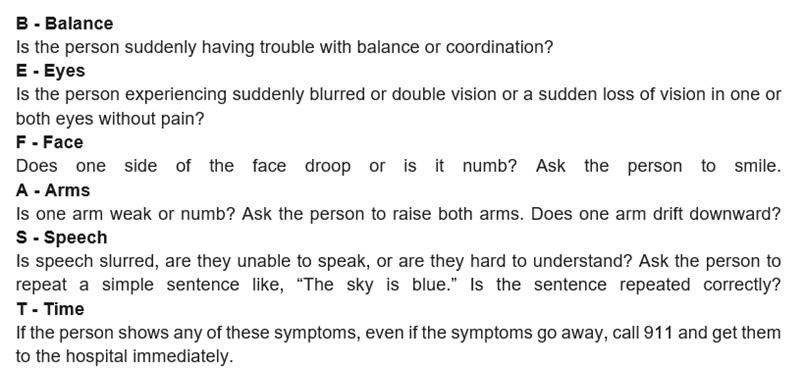May 12, 2022 – The Florida Department of Health in Miami-Dade County recognizes May as Stroke Awareness Month, an observance that highlights the importance of knowing the risk factors, symptoms, and prevention of stroke. Nationally, as well as for Florida, stroke is the fifth leading cause of death and a major cause of serious disability for adults. Although stroke risk increases with age, a stroke can happen at any age.
Stroke is a disease that affects the arteries leading to and within the brain and occurs when the blood supply is interrupted or reduced, preventing brain tissue from getting oxygen and nutrients. Brain cells begin to die in minutes. Early action can reduce brain damage and other complications.
“According to Florida Health Charts, stroke death rates have steadily increased since 2016. The Miami-Dade County stroke death rates have remained higher than the state rate. Knowing your risk factors as well as signs for early recognition and treatment is important, time is of the essence,” said Yesenia Villalta, DNP, MSN, APRN, Health Officer/Administrator of the Florida Department of Health in Miami-Dade County. “Having a stroke is a medical emergency which requires prompt treatment. Knowing your risk factors is essential to preventing this devasting condition.”
Know the Warning Signs of a Stroke
The most important part of getting timely treatment for a stroke is to know and understand the warning signs as described by the B.E. F.A.S.T. acronym.

Take Action to Lower Risk of Having a Stroke
The most effective way to lower the risk of having a stroke is to prevent one from happening in the first place. Risk factors for stroke that can be changed, treated, or medically managed include:
- High Blood Pressure. Blood pressure of 140/90 or higher can damage blood vessels (arteries) that supply blood to the brain. Make sure to get medical treatment if it is high.
- Diabetes. People with unmanaged diabetes are at greater risk for a stroke than someone without diabetes. To prevent stroke, people with diabetes should control blood glucose, blood pressure, cholesterol, and weight.
- Smoking. You can reduce your risk of having a stroke by stopping smoking. Smoking can damage blood vessels as well as the heart and lead to other health diseases that can impact stroke risk.
- Unhealthy Diet. A healthy diet is one of the best tools for fighting stroke. Incorporating more fruits and veggies into your diet and decreasing your salt intake to less than 1,500 mg a day is a great start to healthier eating.
- High Blood Cholesterol. High cholesterol levels can contribute to thickening or hardening of the arteries (atherosclerosis) caused by a buildup of plaque. By controlling their cholesterol, a person is giving their arteries the best chance to remain clear of blockages.
- Lack of Exercise. Aim for 30 minutes of physical activity every day, five days a week. But even 10 minutes of exercise a day offers health benefits.
- Excessive alcohol use. More than 2 drinks per day may raise a person’s blood pressure. Binge drinking can lead to stroke.
- Excess Weight. Obesity increases your risk for stroke. Losing weight can help lower your blood pressure and reduce the burden on your heart, lungs, blood vessels and skeleton.
In honor of Stroke Awareness Month, the Florida Department of Health in Miami-Dade County is holding free blood pressure (BP) checks on the following dates and locations:
Frederica Wilson and Juanita Mann Health Center
2520 NW 75 Street
Miami, Fl 33147
Thursday, May 19th,2022, 9-12pm: BP screenings & mini health fair
Thursday, May 26th, 2022, 9-12pm: BP screenings & mini health fair
West Perrine Health Center
18255 Homestead Avenue
Miami, Fl 33157
Friday, May 20th, 2022, 9-12pm: BP screenings & mini health fair
Friday, May 27th, 2022, 9-12pm: BP screenings & mini health fair
Additionally, for Stroke Awareness Month a Healthy Happens Here webinar will be hosted on Tuesday, May 17, 2022, from 1 p.m. to 2 p.m. During this webinar participants will learn about recognizing signs and symptoms of stroke as well as tobacco cessation and how it is related to cancer. To register, please click here.
For more information on stroke prevention or to schedule screenings please contact the Office of Community Health & Planning at 305-278-3023.
About the Florida Department of Health
The department, nationally accredited by the Public Health Accreditation Board, works to protect, promote and improve the health of all people in Florida through integrated state, county and community efforts.




























